TAYA Pristine Homeland Foundation X Ju-Chen Lin’s “The Classroom in the Paddy Field” (Reported by Global Views Monthly)
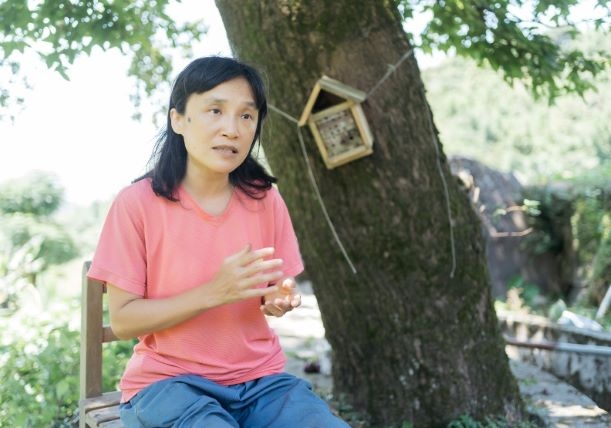
TAYA Group Partners with Permaculture Farmers in the Cultivation of Toxic-free Rice Through the Power of Kindness to Protect the Purity of the Land
Published date: 2022/10/15/
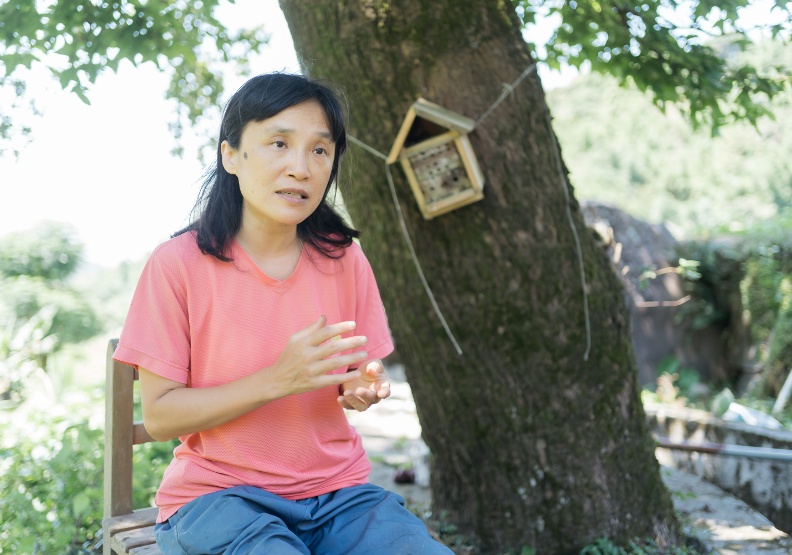
圖 / Image/ Ju-Chen Lin, promoter of friendly farming, is a winner of the 2012 “3rd Green Inside Project” award held by TAYA Pristine Homeland Foundation, and the Green Connector Award in 2020.
Can the simple act of eating rice cure diseases, regulate the climate, or even solve a potential food crisis? Eleven years ago, Ju-Chen Lin, a promoter of friendly farming, began to grow rice using non-toxic methods in the Jingliao Neighborhood of Houbi District, Tainan. Instead of herbicides, Lin uses “chains and brushes” to remove weeds, a method which won her the “Green Inside Project” award from the TAYA Pristine Homeland Foundation. In recent years, she has also advocated for the promotion of food and agriculture education, hoping to use her method of growing rice to connect with the local agriculture community, while protecting the sustainability of the environment.
In mid-July, I drove down to the terraced fields of Yangmingshan. Despite the heat of the summer, I could still feel the coolness from a gentle breeze. “Isn’t it nice and cool in the fields? Did you know that in addition to supplying food, paddy fields can also regulate the climate, conserve water and soil, and provide biological habitats?” Lin spoke while inviting us to try the brown rice cake she had made that morning with Tainan sen No. 18 (TNS18), a variety of rice. The sweetness of the rice could be easily tasted despite the rice cake being unseasoned.
“The nutritional value of TNS 18, which was acknowledged and named in 2018, is comparable to imported wheat and very conducive to friendly farming. However, Taiwan’s annual rice consumption continues to decline and along with the country’s food self-sufficiency ratio. I hope everyone can make changes to their diet, starting with their three daily meals,” said Lin. From friendly farming to promoting the values of rice, Lin’s concern has always been on the issue of sustainability.
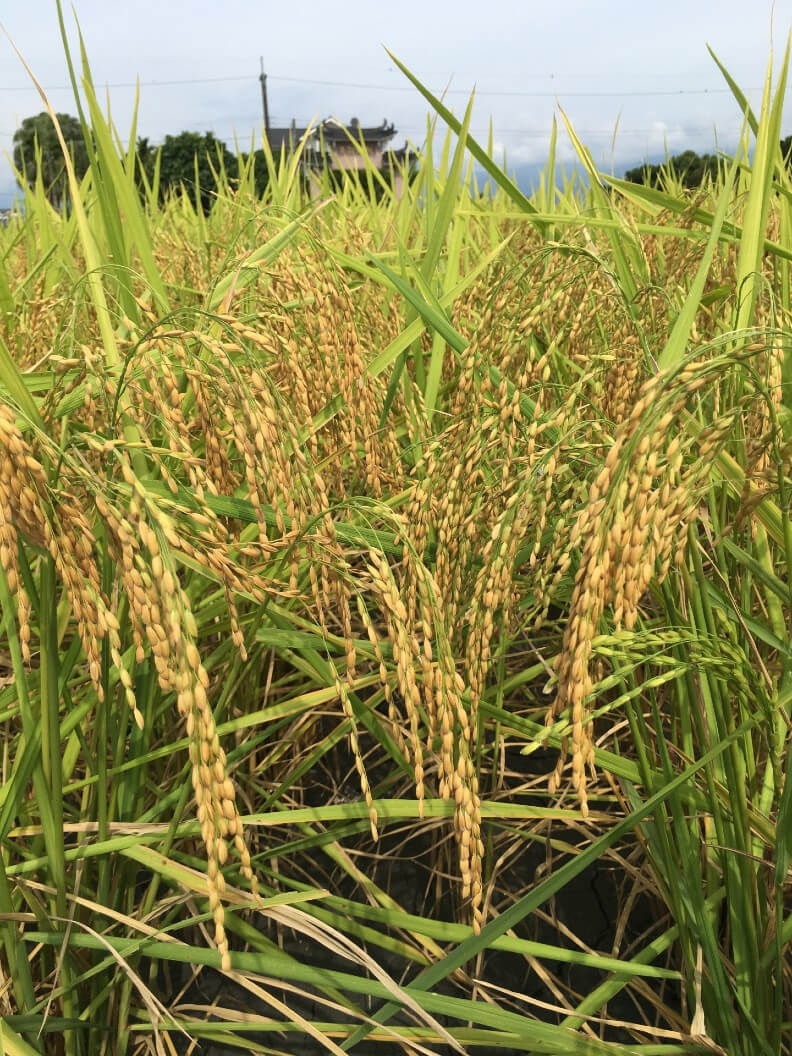
Image/The Tainan sen No. 18 (TNS18) rice variety grown by Ju-Chen Lin in Kelin, Yilan.
As a leading brand in energy connection, TAYA Electrical Wire & Cable practices environmental sustainability within its own industry and established the TAYA Pristine Homeland Foundation, solely tasked with meeting the company’s sustainability targets. The foundation has been involved in environmentally friendly issues and the promotion of such issues for an extended period of time. Beginning in 2007, the foundation’s “Green Inside Project” conducts an annual selection of individuals and initiatives dedicated to protecting the sustainability of the environment in a variety to different areas. The campaign is an effort to educate the public on environmental sustainability and to encourage the public to support a green initiatives.
Lin’s innovative and eco-friendly method of weeding paddy fields using iron chains and brushes was awarded with the 2020 “Green Connection Prize”, and the 3rd edition of the Green Inside Project’s recognition ceremony. These awards not only recognize her efforts and discoveries, but also affirm her determination and dedication to sustainability and the creation of a greener environment.
Becoming a Promoter of Friendly Farming Due to the Health Benefits of Eating Rice
Working as an administrator at a local school. Lin initially began learning about the health benefits of in response to her father’s poor health. Consuming more brown rice not only improved her father’s health, but also rid Lin of the eczema which had plagued her for years. “After improving my health, I felt that the contribution of farmers should be equal to that of doctors. This was the trigger that led me to begin my educational journey of agriculture.”
Lin took her time in learning about ingredients, and the more she learned, the more she wanted to know how these foods were produced. Apart from looking up information on the Internet and reading voraciously, she also enrolled in a variety of agricultural courses. “I had no idea how food was produced until I was in my thirties,” Lin said. “And nevermind other people that live in the city like I did. They must be completely unfamiliar with the concept of agriculture and rice.” Not wanting to rely on just what she read, Lin decided to experiment herself. In a twist of fate, she was able to participate in an organic rice farming experience held in the Jingliao Neighborhood of Houbi, Tainan. This experience eventually led her to purchase a paddy field in Tainan to provide more rehabilitation space for her father, and to allow her to personally experiment with friendly, non-toxic farming methods.
However, it was inevitable that an urban dwellers like Lin would encounter setbacks when learning to farm. She described how she ‘planted rice using the sparse-sowing and sparse-seedling’ methods promoted by the Agricultural Research and Extension Station to avoid the problem of diseases and pests, but the rice farming master that I’d invited over thought I was just messing around. After sparsely planting the seedlings, he actually said ‘Don’t tell the others that I helped you with this. It’s so ugly.” In addition to sparse planting, Lin insisted on not using fertilizers or spraying pesticides. Her first year of planting led to an abundance of weeds which caused Lin to seek assistance from farming aunties in their seventies to help her remove them. “I was thinking, these ladies are older than my mother and are still working so hard. If we continue to farm organically, we may not be able to hire these helpful aunties in 10 years. Could there be a better way?”
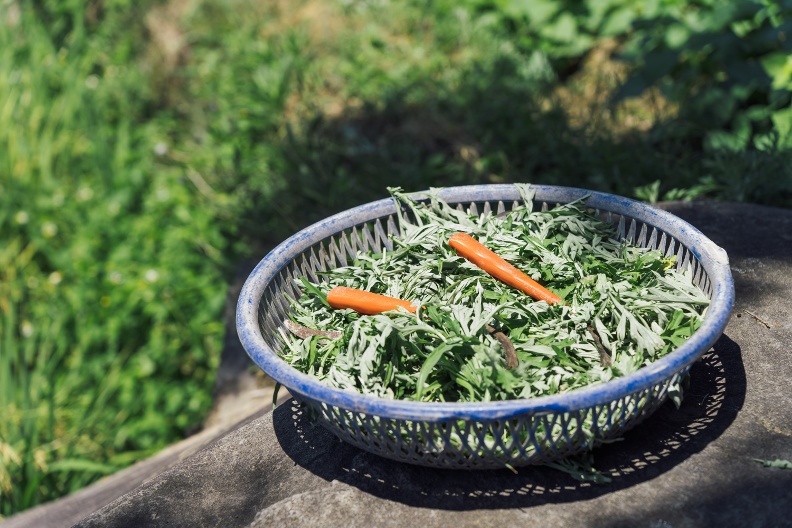
Image/The "Chinese mugwort" is a traditional herbal plant with health-nurturing properties found in the ridges of paddy fields. Lin believes that corporate social responsibility should be actions practiced in our daily lives and not just an empty slogan.
Lin would go on to draw inspiration from “Natsuko no Sake” (Natsuko’s Sake), a Japanese manga series, and Akinori Kimura, famed “Miracle” apple farmer, on her way to discovering the method of weeding with brushes and iron chains. She tried it in the field and they removed about 80% of the weeds. Delighted to let more people know about such a simple, inexpensive, and natural farming method, Lin published her experiences in a book titled, “The Classroom in the Paddy Field.” Lin received help from many people and the book was recognized by the Deep Reading initiative of the Taipei and the Outstanding Reading Program of the Ministry of Culture. Lin’s philosophy coincides with the original intention of the TAYA Pristine Homeland Foundation, which is committed to sponsoring eco-friendly initiatives and promoting environmental sustainability. This is precisely the reason why she was the recipient of the award.
Starting Small to Create Big Change: From Individuals to Enterprises
“Like many people, I used to think that I was far removed from the topics of ecology and environmental protection. I didn’t know how to do it or didn’t want to take action, when in fact, choosing to do things that are good for the environment is actually very simple.” Lin is grateful for the Green Inside Program, as it gave her the chance to meet other environmental sustainability professionals from across Taiwan, many of whom had humble, yet inspiring stories similar to Lin’s. “For example, after visiting the Magic School of Green Technologies at National Cheng Kung University, I made up my mind to build a barn that is as energy-efficient as the one I visited. While I’m not exactly sure how I’ll be able to do it, I believe in the power of dreaming and this vision will come naturally when the time is ripe.”
Lin believes that corporate social responsibility should not just be an empty slogan, but something that needs to be implemented through daily actions across society. “For example, TAYA does not use disposable paper cups in their events, and promotes environmentally-friendly products as well as encourages employees to help clean up rivers and beaches. You can see from the little details that TAYA hopes to bring the concept of a green life into practice within corporate culture. More importantly, this influence is expanded through sponsorship and promotion and also in the form of official recognition or awards. Never would I have thought that I would have potential. But now, because many people know my story, they too have returned to their hometowns to farm and eat rice instead. This has changed the lives of many people,” continued Lin.
Last year, due to severe drought and the impact of the pandemic, Lin became worried about food shortages so she rented two paddy fields in the northern part of Taiwan. The cultivation of rice and the promotion of rice culture has become her life’s calling. “The most important thing in life is to have good water, good air, and good food, but now these things are more precious than ever; I am spending the most important years of my life doing these things out of fear of an existential crisis. I hope that big hands and small hands can join together to take the actions of change, and we can together become the guardians of this beautiful and green homeland.”
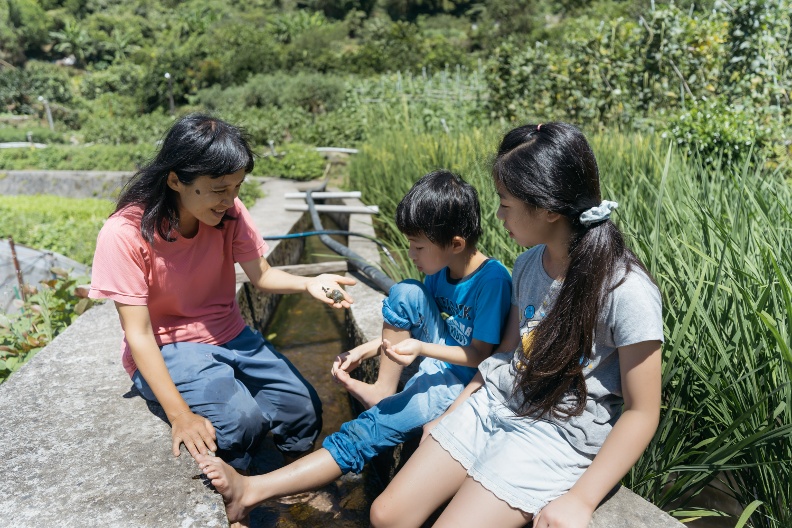
Image/Big hands and little hands join together to take the action of change in becoming the guardians of this beautiful and greenhomeland.
Source of article: Global Views Monthly (https://www.gvm.com.tw/article/92949)

